外研版英语八年级上册重要知识点
- 格式:doc
- 大小:36.50 KB
- 文档页数:7
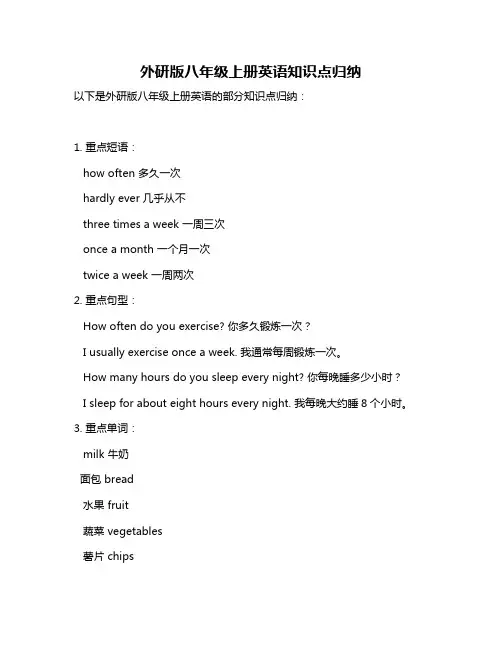
外研版八年级上册英语知识点归纳
以下是外研版八年级上册英语的部分知识点归纳:
1. 重点短语:
how often 多久一次
hardly ever 几乎从不
three times a week 一周三次
once a month 一个月一次
twice a week 一周两次
2. 重点句型:
How often do you exercise? 你多久锻炼一次?
I usually exercise once a week. 我通常每周锻炼一次。
How many hours do you sleep every night? 你每晚睡多少小时?
I sleep for about eight hours every night. 我每晚大约睡8个小时。
3. 重点单词:
milk 牛奶
面包 bread
水果 fruit
蔬菜 vegetables
薯片 chips
糖果 sweets
饮料 drink
4. 语法重点:频率副词和一般现在时的结合使用。
5. 学习策略:通过语境学习语法和词汇,利用语篇来提高语言运用能力。
6. 文化意识:了解不同国家的饮食和生活习惯,增强跨文化交流意识。
希望这些知识点能对你有所帮助,建议查阅外研版八年级上册的英语课本或教辅,获取更全面和准确的信息。

八年级外研版英语上册语法知识点总结与归纳一、时态1. 一般现在时:表示经常性的动作或真理,主语为第三人称单数时,动词需加-s/-es。
2. 现在进行时:表示正在进行的动作,构成为:be + V-ing。
3. 一般过去时:表示过去发生的动作,动词需加-ed。
4. 过去进行时:表示过去某一时刻正在进行的动作,构成为:was/were + V-ing。
5. 现在完成时:表示过去发生的某个动作对现在造成的影响,构成为:have/has + V-ed。
6. 一般将来时:表示将要发生的动作,构成为:will + 动词原形。
7. 现在完成进行时:表示过去开始进行的动作一直持续到现在,并可能持续下去。
构成为:have/has been + V-ing。
二、被动语态1. 被动语态的构成为“be + 过去分词”,被动语态的主语通常是动作的承受者。
2. 被动语态的时态和语态都可以通过助动词“be”加以表示。
三、情态动词1. 情态动词共有9个:can, could, may, might, must, shall, should, will, would。
2. 情态动词用于表示说话人的态度、感情或是某种推测,通常搭配动词原形使用。
四、关系代词1. who/whom:指人,作主语用who,作宾语或补语用whom。
2. whose:指人或物,表示所有关系。
3. that:指人或物,作主语、宾语、表语、定语等,引导限制性定语从句。
4. which:指物,作主语、宾语、表语、定语等,引导非限制性定语从句。
五、虚拟语气1. 虚拟语气用于表示现在或将来的假设情况或与过去相反的情况。
2. “if”引导的虚拟条件句中,主句通常要使用情态动词;与过去相反的虚拟语气要使用“were”。
六、倒装句1. 完全倒装:将助动词或情态动词提到主语前,用于表示强调或出乎意料的语气。
2. 部分倒装:将助动词、情态动词、系动词等提到主语前,用于表示疑问、否定、祝愿等语气。
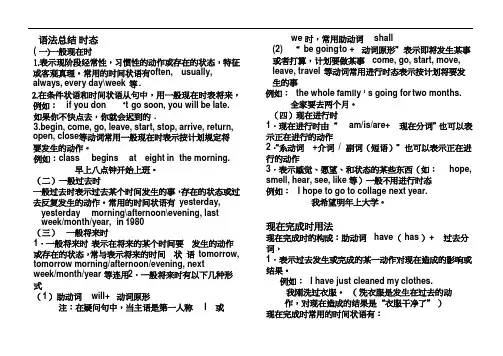
语法总结时态( 一)一般现在时1.表示现阶段经常性,习惯性的动作或存在的状态,特征或客观真理。
常用的时间状语有often, usually, always, every day\week 等.2.在条件状语和时间状语从句中,用一般现在时表将来,例如:if you don ‘t go soon, you will be late.如果你不快点去,你就会迟到的.3.begin, come, go, leave, start, stop, arrive, return, open, close等动词常用一般现在时表示按计划规定将要发生的动作。
例如:class begins at eight in the morning.早上八点钟开始上班。
(二)一般过去时一般过去时表示过去某个时间发生的事,存在的状态或过去反复发生的动作。
常用的时间状语有yesterday,yesterday morning\afternoon\evening, lastweek/month/year, in 1980(三)一般将来时1.一般将来时表示在将来的某个时间要发生的动作或存在的状态,常与表示将来的时间状语tomorrow, tomorrow morning/afternoon/evening, nextweek/month/year 等连用2.一般将来时有以下几种形式(1)助动词will+ 动词原形注:在疑问句中,当主语是第一人称I 或we 时,常用助动词shall(2) “be going t o + 动词原形”表示即将发生某事或者打算,计划要做某事come, go, start, move, leave, travel 等动词常用进行时态表示按计划将要发生的事例如:the whole family ‘ s going for two months.全家要去两个月。
(四)现在进行时1.现在进行时由“am/is/are+ 现在分词”也可以表示正在进行的动作2.“系动词+介词/ 副词(短语)”也可以表示正在进行的动作3.表示感觉、愿望、和状态的某些东西(如:hope, smell, hear, see, like 等)一般不用进行时态例如:I hope to go to collage next year.我希望明年上大学。
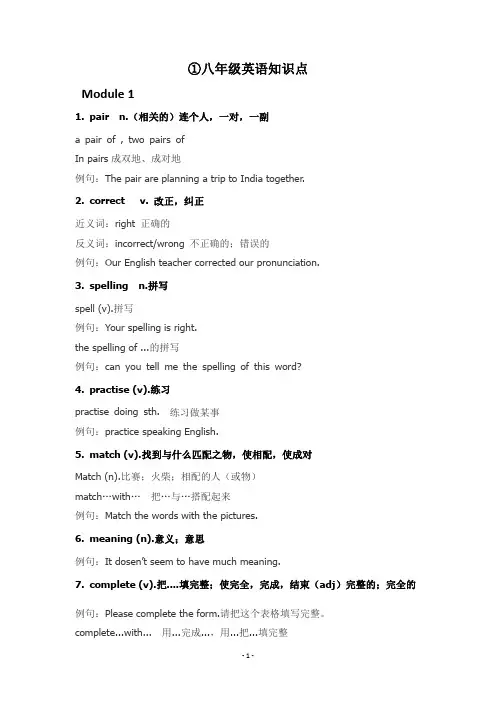
①八年级英语知识点Module11.pair n.(相关的)连个人,一对,一副a pair of,two pairs ofIn pairs成双地、成对地例句:The pair are planning a trip to India together.2.correct v.改正,纠正近义词:right正确的反义词:incorrect/wrong不正确的;错误的例句:Our English teacher corrected our pronunciation.3.spelling n.拼写spell(v).拼写例句:Your spelling is right.the spelling of...的拼写例句:can you tell me the spelling of this word?4.practise(v).练习practise doing sth.练习做某事例句:practice speaking English.5.match(v).找到与什么匹配之物,使相配,使成对Match(n).比赛;火柴;相配的人(或物)match…with…把…与…搭配起来例句:Match the words with the pictures.6.meaning(n).意义;意思例句:It dosen’t seem to have much meaning.plete(v).把....填完整;使完全,完成,结束(adj)完整的;完全的例句:Please complete the form.请把这个表格填写完整。
complete...with...用...完成...,用...把...填完整例句:I completed the job with a new method.Complete the sentences with the words in the box。
用方框中的单词把句子填完整。
8.talk(v).说话;讨论;讲,说;说闲话n.交谈;讨论;报告;空话(1)talk about(vt).讲(谈论,交谈)例句:Please don't talk about it in front of the children.(2)talk to对某人说话(强调单独和某人谈)例句:He stopped to talk to me when seeing me.(3)talk with和...交谈(强调大伙儿一起谈,谈论)例句:I'd like to talk with you.我想和你谈谈。
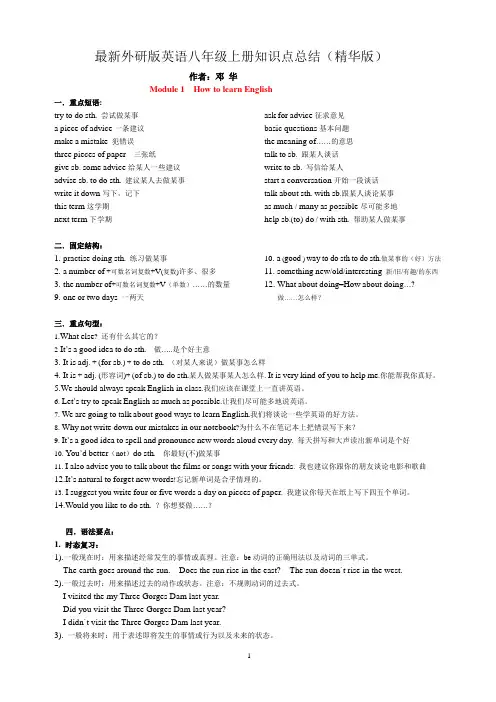
最新外研版英语八年级上册知识点总结(精华版)作者:邓华Module 1 How to learn English一.重点短语:try to do sth. 尝试做某事a piece of advice一条建议make a mistake犯错误three pieces of paper三张纸give sb. some advice给某人一些建议advise sb. to do sth. 建议某人去做某事write it down写下,记下this term这学期next term下学期ask for advice征求意见basic questions基本问题the meaning of……的意思talk to sb. 跟某人谈话write to sb. 写信给某人start a conversation开始一段谈话talk about sth. with sb.跟某人谈论某事as much / many as possible尽可能多地help sb.(to) do / with sth. 帮助某人做某事二.固定结构:1. practise doing sth. 练习做某事2. a number of +可数名词复数+V(复数)许多、很多3. the number of+可数名词复数+V(单数)……的数量9. one or two days一两天10. a (good ) way to do sth to do sth.做某事的(好)方法11. something new/old/interesting新/旧/有趣/的东西12. What about doing=How about doing…?做……怎么样?三.重点句型:1.What else? 还有什么其它的?2 It’s a good idea to do sth. 做…..是个好主意3. It is adj. + (for sb.) + to do sth. (对某人来说)做某事怎么样4. It is + adj. (形容词)+ (of sb.) to do sth.某人做某事某人怎么样. It is very kind of you to help me.你能帮我你真好。

最新外研版英语八年级上册知识点总结
(精华版)
1. 语法知识点
- 时态:包括一般现在时、一般过去时、一般将来时等;
- 基本句型:包括陈述句、疑问句、否定句等;
- 名词:包括可数名词、不可数名词、复数形式等;
- 代词:包括人称代词、物主代词、反身代词等;
- 形容词:包括形容词的比较级和最高级等;
- 副词:包括副词的用法和位置等;
- 连词:包括并列连词、选择连词、从属连词等;
- 介词:包括基本介词和常用介词短语等;
- 动词:包括动词的不同形式、时态和语态等;
- 句子结构:包括主谓结构、主语从句、宾语从句等;
- 非谓语动词:包括动词不定式、动名词和分词等;
2. 词汇知识点
- 单词拼写:包括常见的单词拼写错误;
- 同义词:包括一些常见的同义词辨析;
- 常用短语:包括日常交际中常用的短语;
- 常用惯用语:包括一些惯用语的正确使用;
3. 阅读技巧
- 阅读理解:包括快速阅读和细节理解;
- 阅读速度:包括提高阅读速度和理解能力的方法;
- 阅读技巧:包括推测词义、寻找关键词等技巧;
4. 写作技巧
- 书信写作:包括格式、语言表达和常用句型等;
- 日记写作:包括表达个人感受和经历的方法;
- 作文写作:包括如何组织思路和提高写作水平的方法;
以上是最新外研版英语八年级上册的知识点总结,希望对你的研究有所帮助。

八年级上册英语外研版知识点一、重点短语1. how far 距离多远2. take the bus 乘公共汽车3. get to school 到校4. spend time 花时间5. go to the zoo 去动物园6. the more,the better 越多越好7. come true 实现8. have a good time 玩得开心9. look like 看起来像10. be ready 准备好了11. would like to do sth 想要做某事12. as a result 结果13. too…to 太……而不能14. on the one hand 在一方面15. be/get ready for 对……做好准备16. in the middle of 在……中间17. make/let sb do sth 让某人做某事18. on the weekend 在周末19. be able to 能够20. be afraid of 害怕21. have a good/bad day 过得开心/糟糕22. be careful 当心,小心23. be covered with 被……覆盖24. be famous for 因……而著名25. be full of 充满……的26. feel/seem/look+adj 看起来……27. in the sky/on the ground 在天上/在地上28. in the future 在将来29. in the sun 在阳光下30. be sure to do sth 确定做某事31. of course 当然了32. on fire 着火33. be late for迟到34. on time准时35. go shopping去购物36. be different from与……不同37. be similar to与……相似38. have a picnic野炊39. much too太……40. instead代替;反而,却41. none一点儿也没有,毫无42. all day整天,一整天,一整天;整日,终日。
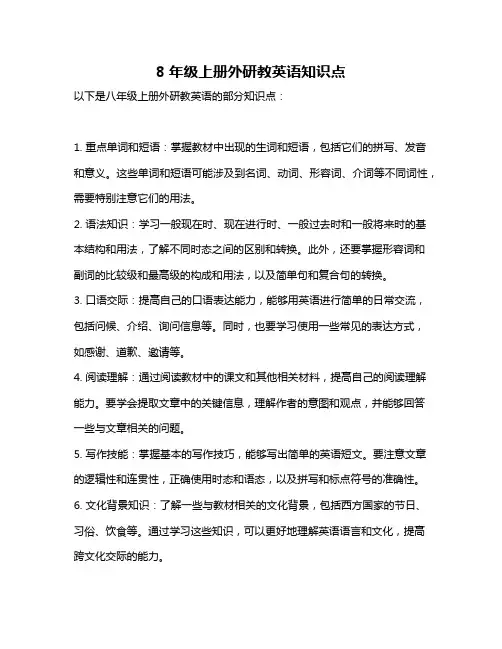
8年级上册外研教英语知识点
以下是八年级上册外研教英语的部分知识点:
1. 重点单词和短语:掌握教材中出现的生词和短语,包括它们的拼写、发音和意义。
这些单词和短语可能涉及到名词、动词、形容词、介词等不同词性,需要特别注意它们的用法。
2. 语法知识:学习一般现在时、现在进行时、一般过去时和一般将来时的基本结构和用法,了解不同时态之间的区别和转换。
此外,还要掌握形容词和副词的比较级和最高级的构成和用法,以及简单句和复合句的转换。
3. 口语交际:提高自己的口语表达能力,能够用英语进行简单的日常交流,包括问候、介绍、询问信息等。
同时,也要学习使用一些常见的表达方式,如感谢、道歉、邀请等。
4. 阅读理解:通过阅读教材中的课文和其他相关材料,提高自己的阅读理解能力。
要学会提取文章中的关键信息,理解作者的意图和观点,并能够回答一些与文章相关的问题。
5. 写作技能:掌握基本的写作技巧,能够写出简单的英语短文。
要注意文章的逻辑性和连贯性,正确使用时态和语态,以及拼写和标点符号的准确性。
6. 文化背景知识:了解一些与教材相关的文化背景,包括西方国家的节日、习俗、饮食等。
通过学习这些知识,可以更好地理解英语语言和文化,提高跨文化交际的能力。
以上是八年级上册外研教英语的部分知识点,希望对你有所帮助。

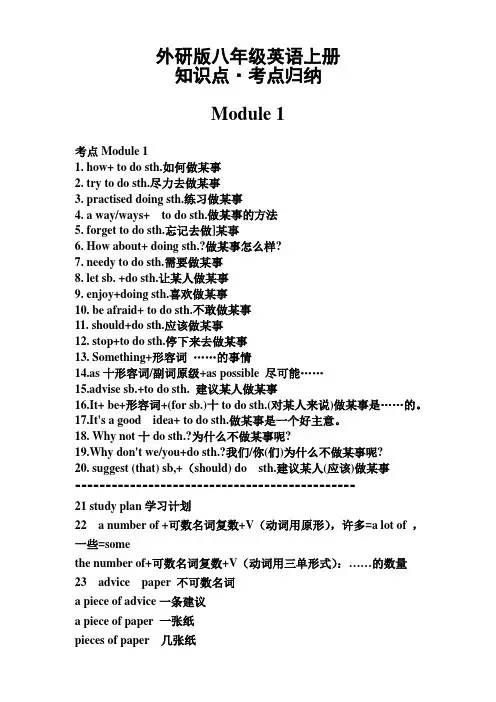
外研版八年级英语上册知识点·考点归纳Module 1考点Module 11. how+ to do sth.如何做某事2. try to do sth.尽力去做某事3. practised doing sth.练习做某事4. a way/ways+ to do sth.做某事的方法5. forget to do sth.忘记去做]某事6. How about+ doing sth.?做某事怎么样?7. needy to do sth.需要做某事8. let sb. +do sth.让某人做某事9. enjoy+doing sth.喜欢做某事10. be afraid+ to do sth.不敢做某事11. should+do sth.应该做某事12. stop+to do sth.停下来去做某事13. Something+形容词……的事情14.as十形容词/副词原级+as possible 尽可能……15.advise sb.+to do sth. 建议某人做某事16.It+ be+形容词+(for sb.)十to do sth.(对某人来说)做某事是……的。
17.It's a good idea+ to do sth.做某事是一个好主意。
18. Why not十do sth.?为什么不做某事呢?19.Why don't we/you+do sth.?我们/你(们)为什么不做某事呢?20. suggest (that) sb,+(should) do sth.建议某人(应该)做某事----------------------------------------------21 study plan学习计划22 a number of +可数名词复数+V(动词用原形),许多=a lot of ,一些=somethe number of+可数名词复数+V(动词用三单形式):……的数量23 advice paper 不可数名词a piece of advice一条建议a piece of paper 一张纸pieces of paper 几张纸give sb. some advice给某人一些建议advise sb. to do sth.建议某人去做某事24 write it/them down把它写下来25 what else?还有什么其他的?26 It is adj. (for sb. )to do sth.(对某人来说)做某事怎么样It is difficult for old people to learn English well.某人做某事某人怎么样It is adj. (of sb.) to do sth.It is very kind of you to help me.27 It is a good idea\way to do sth.做某事时个好主意、好办法。
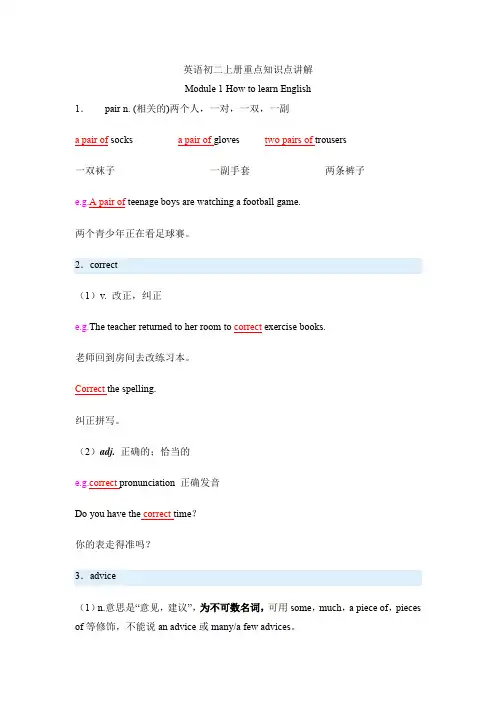
英语初二上册重点知识点讲解Module 1 How to learn English1.pair n. (相关的)两个人,一对,一双,一副a pair of socks a pair of gloves two pairs of trousers一双袜子一副手套两条裤子e.g.A pair of teenage boys are watching a football game.两个青少年正在看足球赛。
2.correct(1)v. 改正,纠正e.g.The teacher returned to her room to correct exercise books.老师回到房间去改练习本。
Correct the spelling.纠正拼写。
(2)adj.正确的;恰当的e.g.correct pronunciation 正确发音Do you have the correct time?你的表走得准吗?3.advice(1)n.意思是“意见,建议”,为不可数名词,可用some,much,a piece of,pieces of等修饰,不能说an advice或many/a few advices。
(2)表示“有关……的建议”时,用介词on,接名词、代词或由疑问词引导的不定式。
e.g.Let’s ask for his advice on what to do next.我们去征求一下他的意见下一步该怎么办。
常见搭配:take/follow one’s advice接受某人的建议ask for advice 征求意见accept/refuse one’s advice接受(拒绝)某人的建议offer advice to sb. 向某人提供建议拓展:advise vt.建议常见搭配:advise sb. to do sth.advise that sb. (should) do sth.e.g.My teacher advises me to leave now.老师建议我现在就离开。
外研八年级上知识总结一、重要短语1. more and more 越来越多2. in the future 在未来3. do shopping 购物4. at the weekend 在周末5. get up 起床6. do homework 做作业7. go to bed 上床睡觉8. go to the cinema 去看电影9. on the/a weekend 在周末10. in a week 在一周内二、重点句型1. It will be + 形容词 + in + 时间段 + 表示未来某个时间点之前会发生的情况。
2. What will you do + 时间点?你将在什么时候做什么?3. How will you go to + 地点?你将如何去某地?4. Let’s + 动词原形 + 表示建议或提议。
5. What are you doing + 时间点?你正在做什么?6. When are you going + 动词不定式?你打算什么时候做某事?7. How long will it take you to do sth?做某事需要多长时间?8. It takes sb some time to do sth某人花费一些时间做某事。
9. I’m sorry to hear that听到这个消息我很难过。
10. I hope to do sth我希望做某事。
三、语法重点1. 将来时态的构成和用法。
2. 宾语从句的用法,包括连接词和语序。
3. 情态动词的用法,包括can、may、must等。
4. 现在完成时的用法,包括have/has been和have/has done的区别。
5. 形容词的比较级和最高级的用法。
6. 反身代词的用法,包括强调主语和表示强调等。
(外研版)初中英语八年级上册知识点归纳总结Module 1一、重点短语1. look up 查;查找2. make a mistake 犯错误3. talk about 谈论;讨论4. speak English 讲英语5. write down 写下;记下6. next to 在……旁边;紧挨着7. listen to the radio 听广播8. be good for 对……有好处9. write to 给……写信10. a little 有点11. agree with sb. 同意某人12. talk to 跟……交谈13. send sth. to sb. 把某物(发)送给某人14. ask for 请求15. watch films 看电影16. be from 来自17. smile at 冲……微笑18. go to bed 去睡觉19. get up 起床20. think about 考虑21. make friends with sb. 与某人交朋友22. take sb. around sp. 带领某人参观某地23. a few 几个;一些24. invite sb. to 邀请某人到……25. be good at 擅长26. for example 例如二、重点句型1. advise sb to do sth 建议某人做某事2. be afraid to... 害怕做……3. be good for... 对……有好处的4. be (a) great way(s) to do sth 做……的(一种)好方法5. It is natural to do sth. 做某事是合乎常情的。
三、重点语法1. Why not...? = Why don’t + you (we / they...)...?意为“为什么不……呢?”,后接动词原形。
eg:Why not / Why don’t we help the old cleantheir rooms this afternoon?今天下午为什么不去帮助老人打扫房间呢?2. What / How about...? 意为“……怎么样?”,其中about 是介词,后接名词或动词-ing 形式。
外研版八年级上英语各模块知识点汇总Module1 How to learn English 模块知识清单一、重点词组1、talk about 谈论,谈及2、that’s a good idea 好主意3、agree with somebody 同意,和…意见一致4、look up 查阅,仰望,向上看5、make a mistake 犯错误6、as much as possible 尽可能多地7、write to somebody 给某人写信8、write down 写下9、try to do 尽力做某事10、how/What about+ doing 做…怎么样11、why not/don’t you+ do 为什么不…12、should/can do 应该/能够做某事13、ask for advice 征求意见14、advise somebody to do something15、suggest somebody (should) do 建议某人做某事16、be afraid to do 害怕做某事17、start a conversation 开始交谈18、be good at doing=do well in doing 擅长做某事19、let’s try to do something 让我们努力做20、It’s a good idea to do 做…是个好主意21、remember to do 记得做某事22、practice doing 练习做某事23、make friends with 和…交朋友24、invite somebody to someplace 邀请某人去…25、make plans 制定计划二、重点句型1、We should always speak English in class.情态动词should /shouldn’t ,should 表示应该shouldn’t不应该You should speak English every day.He shouldn’t tell you the bad news.2、Don’t forget to write down the correct answers next to the mistakes. What else? write down 写下记下代词必须放在两个词之间名词可以放在中间也可以放在末尾如write it down (正)write the sentence down (正)write down it (误)write down the sentence (正)类似的短语有: put on pick up 等next to 紧挨着、紧靠着The little boy sat next to his mother.My home is next to a bank. 【同义词】near 在附近3、Many students ask for advice about how to improve their English。
以下是八年级上册外研社版英语知识点归纳:1. 重点短语:(1) how often 多久一次(2) as for 至于(3) on weekends 在周末(4) most of the time 大部分时间(5) practice doing sth. 练习做某事(6) spend time doing sth. 花时间做某事(7) go to the movies 看电影(8) look after 照顾(9) stay healthy 保持健康(10) get a headache 头疼2. 重点句型:(1) What do you usually do on weekends? 你通常在周末做什么?(2) How often do you exercise? 你多久锻炼一次?(3) I usually read books at home on weekends. 我通常在周末在家看书。
(4) My eating habits are different from his. 我的饮食习惯和他不同。
3. 语法知识:(1) 现在进行时表示正在进行的动作或存在的状态,常与now,listen,look等词连用。
结构是be动词+动词的ing形式。
如:I am doing my homework now. 我正在写作业。
(2) 现在进行时的一般疑问句和否定句的变化:把be动词提前,变成一般疑问句;在be动词后加not,变成否定句。
如:Are you playing football? 你们在踢足球吗?-No,we are not. 不,我们没有。
(3) 频度副词:表示动作发生的频率,如:always,often,sometimes,never等。
如:How often do youwatch TV? 你多久看一次电视?。
英语初二上册重点知识点讲解Module 1 How to learn English1. advice〔 1〕意思是“建议,建议〞,为不能数名词,可用some, much, a piece of, pieces of 等修饰,不能够说 an advice 或 many/a few advices 。
〔 2〕表示“有关的建议〞时,用介词on,接名词、代词或由疑问词引导的不定式。
e.g. Let’ s ask for his advice on what to do next.常有搭配:take/follow one ’s advice接受某人的建议ask for advice征采建议拓展:advise vt.建议常有搭配: advise sb. to do sth.e.g.My teacher advises me to leave now.老师建议我现在就走开。
2. Each time you will learn something new. I also advise you to talk about the films or songswith your friends. 每次你将会学习一些新东西。
我也建议你和朋友们议论电影或歌曲。
time 的用法:〔 1〕 time 指“时间〞用作不能数名词,前面可much, little, a lot of, plenty of等修饰。
〔 2〕看作“次数;倍数〞讲时,time 是可数名词。
e.g.I have been to Beijing three times.〔 3〕 time 构成的短语:at a time一次,每一次at one time以前,一度at times /from time to time有时,有时all the time总是,素来in time及时,早晚on time准时〔 4〕 time 构成的句型:①It ’s time for sb. to do sth./It ’ s (high) time sb. did sth. 该是某人干的时间了。
外研社英语8年级上册知识点归纳外研社英语8年级上册知识点归纳第一部分:语法1. 一般现在时一般现在时表示经常性的或习惯性的动作,或者表示客观事实等。
例如:I usually get up at six in the morning.Water boils at hundred degrees Celsius.2. 一般过去时一般过去时表示已经发生了的动作或状态。
例如:I met him yesterday.He didn’t go to the party last night.3. 现在进行时现在进行时表示正在进行的动作。
例如:I am watching TV right now.They are having dinner together.4. 一般将来时一般将来时表示将来时发生的事。
例如:I will stay at home tomorrow.She won’t come to the meeting.5. 情态动词的用法情态动词包括 can、may、must、shall、should、will等。
它们用来表示一种语气、情态或者家庭中发生的事情。
例如:We should study hard for the exam.You must finish your homework before dinner.第二部分:词汇1. 动物动物类词汇,包括常见动物、动物的身体部位、动物的饲养和保护等。
例如:cat、dog、panda、lion、neck、tail、pet、zoo、wildlife等。
2. 食物食物类词汇,包括早餐、午餐、晚餐、小吃、饮品等。
例如:toast、milk、coffee、hamburger、pizza、salad等。
3. 旅行用语旅行用语类词汇,包括交通工具、旅行目的地、旅行中使用的语言等。
例如:by plane、train、bus、boat、beach、museum、souvenir等。
外研版英语八年级上册重要知识点1. 英语中的“花费”spend : sb. spend some time on sth.某人花费时间做某事sb. spend some time (in) doing sth. 某人花费时间做某事sb. spend some money on sth. 某人花费钱买某物sb. spend some money (in) buying sth.某人花费钱买某物cost: sth . cost sb. some money 某物花去某人钱pay: sb. pay some money for sth. 某人支付钱take: It takes (took) sb. some time to do sth.做某事花去某人时间2.the number of“…的数目”,后跟名词复数,动词用三单, a number of =many,“大量,许多”后跟名词复数,动词用复数形式。
(a large number of,a small number of )3.英语中的“四说”(1)speak说语言,(2)say说内容,(3)talk与谁说,(4)tell告诉,讲述.speak to sb 和某人讲话,say hello to sb. 向某人问好,to sb.向某人说再见,英语中的“四看”(1)watch观看电视、戏剧、比赛和表演,(2)see看人、电影、医生、风景,(3)read看书,看报,(4)look看黑板、看某物。
4.It is +adj.+of sb +to do sth.写性格,品质,如:kind, good, nice , right, wrong, clever, careless, polite, foolish等。
It is+adj+for sb +to do sth. 对物的评价,如:difficult ,easy hard, dangerous, important,等5.表示“建议”的句型:(1). why don't you do sth?=why not do sth?(2). How about doing sth?=what about doing sth?(3). You should /can do sth.(4). Remember to do sth.(5)Don't forget to do sth.(6). can you do sth ?(7). Let's do sth.(8). It'sa good idea to do sth.(9).would you like to do sth.?(10).Shall we do…?(11)You’d better(not) do sth.回答:Thanks a lot.Great/ OK.That's right.All right.Good idea.Sure.6.形容词修饰不定代词somebody, some one“某人”,anybody,anyone “任何人”nobody,no one,“没人”,everyone,everybody“每个人”,something“某物”,anything“任何物”,nothing“没事”,everything “一切事物”时,要放在他们的后面(即后置)。
如:something wrong,something important .7.such 和sosuch+a /an +adj+单数名词so +adj+a/an+单数名词(名前such,形副so)。
8.乘坐交通工具的表达法:take the(a) +交通工具t o =go...by+交通工具=go...on /in+a(the)+交通工具(小汽车只能用in ,其余的可用in ,on);9.already,just和yetalready“早已”,用于完成时的肯定,;yet,用于完成时的否定和疑问;just,用于完成时10.so ...that“如此...以致于....”如果that后是否定,就可以用too...to 转换,如果是肯定就用“形容+enough(for sb )to do sth.”。
如:他太小以致于不能上学。
He is so young that he can’t go to school.He is too young to go to school.He is not old enough to go to school.11. over“在..上面(正上方)”,中间有段空间,反义为underon“在...上面(贴着物表)”,反义beneath,above“在..上方(高出)”,反义below12.none用于三个(三个以上)的全否定,反义为all;neither两个都不,反义为both.13.感官动词see ,hear ,watch,feel ,notice,smell,taste+名词或代词+动词原形(表示动作已经发生)see ,hear ,watch,feel ,notice,smell,taste+名词或代词+Ving(表示动作正在进行)14.英语中当几个单数人称同时作主语时,先后顺序是“二、三、一”英语中当几个复数人称同时作主语时,先后顺序是“一、二、三”15.四个“也”also用于肯定,置于句中,放在行为动词前,系动词be 后;too用于肯定,置于句末;as well用于肯定,置于句末;either用于否定,置于句末.16.bring,“拿来,带来”(从外往里拿),take ,“拿走,带走”(从里往外拿),carry无方向, fetch往返拿,17.die of “患..而死”,常接hunger, cold, illness,cancer内部原因,die from“由于..,而死”,常接a wound ,an accident,carelessness外部原因,18.give sb. sth.=give sth. to sb. 给某人某物19.how about doing sth.=what about doing sth.做....怎么样20.thanks a lot= thank you very much 非常谢谢21.That's all right. =You're welcome.= That'OK.= It's my pleasure.=Not at all.22.Why don't you+V原...=why not+...V原“为什么不”23.help sb. with sth. 在某方面帮助别人, help sb. (to )do sth.帮助某人做某事with one's help=with the help of sb.在某人的帮助help oneself to sth.请自用食物24.remember to do sth.“记得要做某事”(还没有做),remember doing sth.“记得做过某事”(已经做了)25.forget to do sth. “忘记要做某事”(还没有做) forget dong sth.“忘记做过某事”(已经做了)。
26.other其他的,另外的,别的;another另一个人或事物;the other两个中的另一个;the others其余的,剩下的人或事物;others其他的,另外的,别的人或物27.look for 寻找, look after=care for=take care of照顾28.look up 向上看,查阅, look like看起来像,29. look at 看着, look on sb. as把某人看作, look forward to doing sth. 盼望,期待做某事look over检查/翻阅,look out当心/向外看, look through仔细查看,30.be ready for =get ready for=prepare for为…准备好,be ready 准备好be (get ) ready to do sth.准备做某事,乐意做某事31.take a message捎个口信,leave a message留个口信,32.be good for对…有好处,be bad for 对…有害,be good at =do well in擅长于…,在…方面做得好be poor at =be bad at =do badly in=be weak in不擅长… ,在…方面做得不好33.think of 想起,think about想出,think over仔细考虑,34.hear of听说,hear from=receive a letter from 收到某人的来信,write to…给…写信35.enjoy oneself=have a good time=have a great time=have fun,玩得愉快/开心36 .lots of =a lot of =many(可数)许多,lots of =a lot of = much(不可数) 许多,37.ask for 请求,要求, ask sb. for sth.向某人要某物ask sb. to do sth.要求某人做某事38.动词enjoy ,finish , practice , mind, miss , consider , keep,continue后跟动名词形式V-ing 。
39.find+ it+ adj+to do sth.发现做某事怎么样40.what else?=what other things? 还有什么41. in a tree=in the tree ,在树上(外来物)on a tree =on the tree,在树上,(树本身的)42.be famous for ,因..而著名(后+人或物某方面的特点,特长)be famous as ,作为...而闻名(后+身份职业)43.alone,个体单独,独自;lonely,孤独,寂寞,也表示荒凉,。